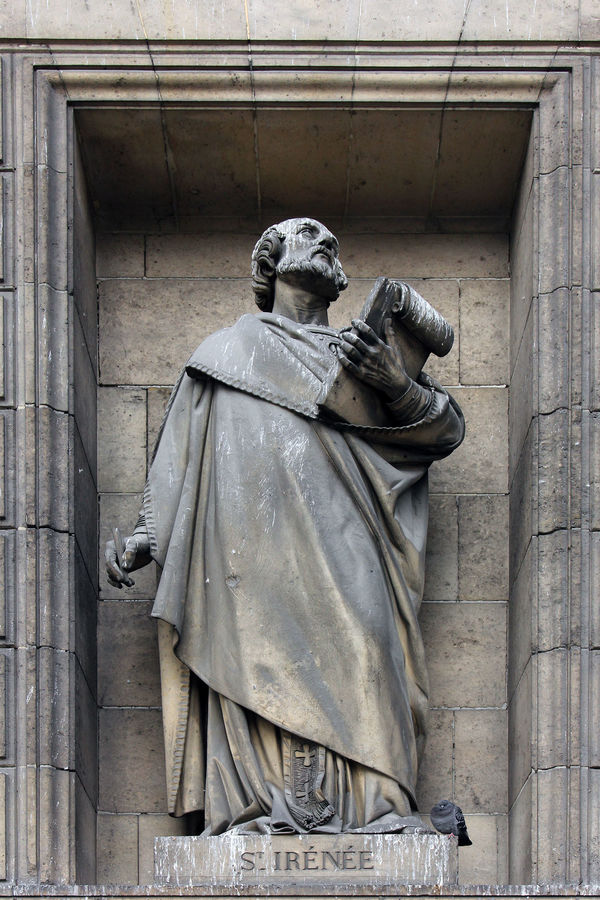 St. Irenaeus. Photo via Zvonimir Atletic / Shutterstock.com
St. Irenaeus. Photo via Zvonimir Atletic / Shutterstock.com
About 45 years ago — somewhere between the end of the Baltimore Catechism and the new Catechism of the Catholic Church — when Argus posters had won the day as the best source for theology, I heard of St. Irenaeus. One particular poster featured a flower in bloom accompanied by the words, “The glory of God is man fully alive.” — St. Irenaeus.
I had never heard of St. Irenaeus before, but I really liked the phrase. I remember thinking that I wanted to become fully alive. In my youth at that time, however, I had no idea how hard it would be to become fully alive — in other words, for Christ to be my whole life, my everything. I did not know that it would involve so many deaths and resurrections, so much failure and forgiveness, so much sin and mercy.
Many years have passed since I read those words. There has been a tremendous amount of dying and rising, of sinning and forgiving, more than I ever could have imagined. I have learned many lessons along the way, and I’ve started to develop a theory on what it means to be fully alive.
I do not think that you can become fully alive if you live in a black and white world. To be fully alive, you must be able to live in the gray. In a black and white world, success requires perfection, and the smallest missteps can spell certain disaster. A gray world comes with a safety net: mercy and forgiveness. This safety net makes it possible to fall and fail, but to get up again and again. This safety net makes it possible to trust in God’s relentless mercy. You understand that you will fail, and you know that God will catch you. The safety net teaches us that mercy and grace are unmerited, free and abundant. Therese of Lisieux wrote that "everything is grace." The safety net helps us to understand this and that God can work through everything — good and bad — to bring about good.
Being fully alive, I think, also requires a theology of abundance and generosity. There seem to be two theologies of life, one of abundance and generosity, the other of fear and scarcity. A theology of fear and scarcity means that we think that we’re going to run out of mercy or love or life or air. The apostles often operated out of fear and scarcity. How will we ever feed all these people with so little? And yet we know that their fear was unfounded. In the story of the Loaves and Fishes, not only did they feed the 5,000 members of the gathered crowd, they had more left over afterwards than they had when they started!
The whole world is oriented towards a theology of abundance and generosity. It takes one seed to start a tree and yet millions of seeds fall. This theology of abundance and generosity invites us to give ourselves entirely over to life, to live, to give ourselves, to spend ourselves, to burn out instead of rusting out! A much better idea! A theology of abundance and generosity allows us to fall and to get up, to trust in God’s work in our lives and not in our accomplishments.
A wonderful paragraph in the book The Shoes of the Fisherman by Morris West reads,
“It costs so much to be a full human being that there are very few who have the enlightenment, or the courage to pay the price. . . .One has to abandon altogether the search for security, and reach out to the risk of living with both arms. One has to embrace the world like a lover, and yet demand no easy return of love. One has to accept pain as a condition of existence. One has to count doubt and darkness as the cost of knowing. One needs a will stubborn in conflict, but apt always to the total acceptance of every consequence of living and dying.”
This quotation speaks of a theology of abundance and generosity, a theology of a safety net of mercy and forgiveness. My heart breaks for people who do not have this safety net. Without this safety net, they have to live in a black and white world, no room for failure and growth, no room for dying and rising, and little room for mercy and forgiveness, making it virtually impossible to become a full human being.
If becoming fully alive means Christ being my life, my all, my everything, then we all want it desperately. But we can only get there with a safety net of mercy and forgiveness, with a theology of abundance and generosity. In that abundance and generosity, we are open to the relentless mercy of God, which saves us at every moment of our existence. Being fully alive gives wonderful glory to God, or, as St. Irenaeus put it, is the glory of God. May we all aspire to such a glorious way of living.
Fr. Joe Corpora, C.S.C., is the Director of University-School Partnerships within Notre Dame's Alliance for Catholic Education, the associate director of pastoral care for students in Campus Ministry, and a priest-in-residence in Dillon Hall. He is one of 700 priests whom Pope Francis appointed in February 2016 to serve as Missionaries of Mercy and his book of reflections on this experience, The Relentless Mercy of God, was published last spring by Corby Books.